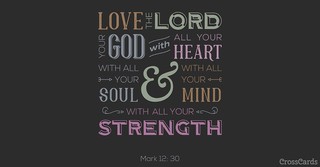
- Recent Translations
- All Translations
Mark 12
Share
Settings
Mark 12 Commentary
Chapter 12
The parable of the vineyard and husbandmen. (1-12) Question about tribute. (13-17) Concerning the resurrection. (18-27) The great command of the law. (28-34) Christ the Son and yet the Lord of David. (35-40) The poor widow commended. (41-44)
Verses 1-12 Christ showed in parables, that he would lay aside the Jewish church. It is sad to think what base usage God's faithful ministers have met with in all ages, from those who have enjoyed the privileges of the church, but have not brought forth fruit answerable. God at length sent his Son, his Well-beloved; and it might be expected that he whom their Master loved, they also should respect and love; but instead of honouring him because he was the Son and Heir, they therefore hated him. But the exaltation of Christ was the Lord's doing; and it is his doing to exalt him in our hearts, and to set up his throne there; and if this be done, it cannot but be marvellous in our eyes. The Scriptures, and faithful preachers, and the coming of Christ in the flesh, call on us to render due praise to God in our lives. Let sinners beware of a proud, carnal spirit; if they revile or despise the preachers of Christ, they would have done so their Master, had they lived when he was upon earth.
Verses 13-17 The enemies of Christ would be thought desirous to know their duty, when really they hoped that which soever side he took of the question, they might find occasion to accuse him. Nothing is more likely to insnare the followers of Christ, than bringing them to meddle with disputes about worldly politics. Jesus avoided the snare, by referring to the submission they had already made as a nation; and all that heard him, marvelled at the great wisdom of his answer. Many will praise the words of a sermon, who will not be commanded by the doctrines of it.
Verses 18-27 A right knowledge of the Scripture, as the fountain whence all revealed religion now flows, and the foundation on which it is built, is the best preservative against error. Christ put aside the objection of the Sadducees, who were the scoffing infidels of that day, by setting the doctrine of the future state in a true light. The relation between husband and wife, though appointed in the earthly paradise, will not be known in the heavenly one. It is no wonder if we confuse ourselves with foolish errors, when we form our ideas of the world of spirits by the affairs of this world of sense. It is absurd to think that the living God should be the portion and happiness of a man if he is for ever dead; and therefore it is certain that Abraham's soul exists and acts, though now for a time separate from the body. Those that deny the resurrection greatly err, and ought to be told so. Let us seek to pass through this dying world, with a joyful hope of eternal happiness, and of a glorious resurrection.
Verses 28-34 Those who sincerely desire to be taught their duty, Christ will guide in judgment, and teach his way. He tells the scribe that the great commandment, which indeed includes all, is, that of loving God with all our hearts. Wherever this is the ruling principle in the soul, there is a disposition to every other duty. Loving God with all our heart, will engage us to every thing by which he will be pleased. The sacrifices only represented the atonements for men's transgressions of the moral law; they were of no power except as they expressed repentance and faith in the promised Saviour, and as they led to moral obedience. And because we have not thus loved God and man, but the very reverse, therefore we are condemned sinners; we need repentance, and we need mercy. Christ approved what the scribe said, and encouraged him. He stood fair for further advance; for this knowledge of the law leads to conviction of sin, to repentance, to discovery of our need of mercy, and understanding the way of justification by Christ.
Verses 35-40 When we attend to what the Scriptures declare, as to the person and offices of Christ, we shall be led to confess him as our Lord and God; to obey him as our exalted Redeemer. If the common people hear these things gladly, while the learned and distinguished oppose, the former are happy, and the latter to be pitied. And as sin, disguised with a show of piety, is double iniquity, so its doom will be doubly heavy.
Verses 41-44 Let us not forget that Jesus still sees the treasury. He knows how much, and from what motives, men give to his cause. He looks at the heart, and what our views are, in giving alms; and whether we do it as unto the Lord, or only to be seen of men. It is so rare to find any who would not blame this widow, that we cannot expect to find many who will do like to her; and yet our Saviour commends her, therefore we are sure that she did well and wisely. The feeble efforts of the poor to honour their Saviour, will be commended in that day, when the splendid actions of unbelievers will be exposed to contempt.
